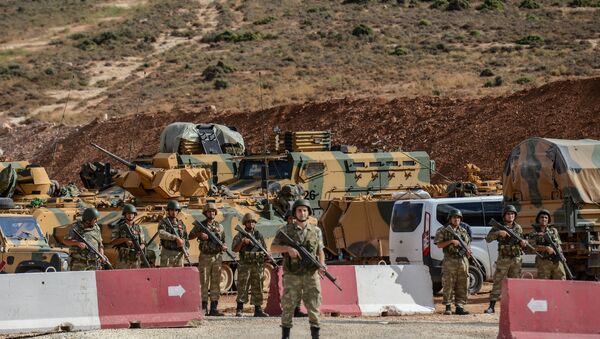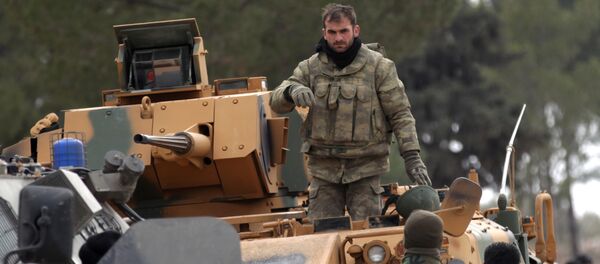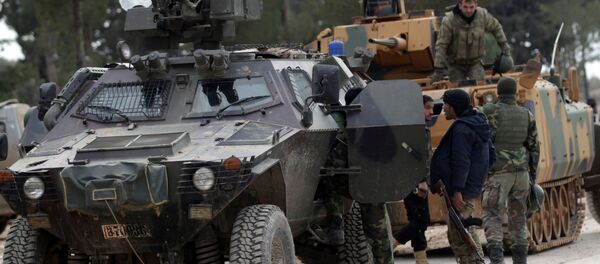Damascus wants to establish direct contacts with Turkey, since it is important for Syrian President Bashar al-Assad to gain recognition from Ankara, retired Lieutenant General Ismail Hakki Pekin, former chief of the Turkish General Staff Intelligence Department, told Sputnik, commenting on the SANA news agency report denouncing "an incursion of Turkish military forces" into Idlib.
"You know that at present Turkey does not maintain direct contacts with Syria," Pekin, who had earlier taken part in Turko-Syrian negotiations as a member of an intermediary delegation, told Sputnik Turkey. "Communications between the parties concerning the decisions made within the framework of the Astana talks are carried out with the help of Russia and Iran."
The former intelligence chief admitted that Damascus's had real grounds for its warning, adding that "no matter how right the neighboring country is, if foreign troops enter his country, Assad must answer to his own people."
"Therefore… he felt the need to make such a statement," the retired lieutenant general surmised.
Stark Difference Between US, Russian Goals in Syria
Retired Turkish Brigadier General Naim Baburoglu, who also spoke to Sputnik, suggested that, while issuing the warning, Damascus did not expect that Turkey would immediately withdraw its military forces from the territory of the country.
"What deserves attention is whether Russia issued its own statement [concerning the matter] after Damascus. If Damascus's warning toward Turkish forces was serious, if Syria really opposed Turkey's presence in Idlib Russia would have immediately given a warning to [Ankara]," Baburoglu said, adding that "this didn't happen."
Therefore, according the retired brigadier general, it's possible to view Damascus's message as being aimed at the Syrian people.
According to the former military official, Damascus and Ankara may start direct negotiations in the near future, given the fact that Turkey is very interested in maintaining territorial integrity of Syria and Iraq.
"This is exactly what is required under current conditions," Baburoglu highlighted.
Assessing the situation around Idlib, the retired brigadier general noted that it "showed that the winner in Syria is Russian President Vladimir Putin," and not the US-led coalition.
"Putin's political goals in Syria were initially obvious," he explained. "The Russian military forces had to ensure the safety of the [democratically-elected government] of Assad, and to expel terrorists primarily from Damascus and Aleppo. They did it. As soon as the operation to liberate Idlib is completed, it will be safe to say that Assad emerged victorious in this war."
On October 12, Turkish troops, including Special Forces, and 30 armored vehicles entered the Idlib de-escalation zone.
According to the Turkish General Staff, the country's armed forces operating in the region will observe the ceasefire, ensure humanitarian aid deliveries and create conditions for the population to return to their homes. Ankara insists that the operation is being waged within the framework of agreements reached in Astana.
On October 14, Syrian news agency SANA reported, citing a source in the Syrian Foreign Ministry, that Turkey's Idlib operation was a "blatant aggression against the sovereignty and territorial integrity of Syria and a flagrant violation of international law and norms." The source added that the operation "has nothing to do" with the agreements reached during the latest round of the Syrian peace talks in Astana brokered by Russia, Iran and Turkey.
The next day, while delivering his speech at the Assembly of the Inter-Parliamentary Union (IPU) in the Russian city of St. Petersburg, Hammoudeh Sabbagh, the speaker of the Syrian parliament, said that the country's lawmakers "demanded the withdrawal of Turkish forces without any preconditions."
"We consider this attack an invasion of our territory, a threat to the security of our citizens. We consider this to be a violation of the norms of international law," Sabbagh highlighted.
The statements came as a response to the beginning of the Turkish operation in the Syrian province of Idlib to support the Free Syrian Army rebels' fight against al-Nusra Front terrorists. The region still remains under the control of Hayat Tahrir al-Sham (HTS), a militant group led by the former al-Qaeda affiliate.




